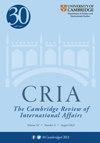TimeSpace of the ‘international’?
IF 1.3
3区 社会学
Q2 INTERNATIONAL RELATIONS
引用次数: 1
Abstract
Abstract The ‘international’, the ‘global’, the ‘world’ have become different ways of characterising what it is IR as a field studies. The semantic change signals two dynamics. Firstly, the assumption being that the international has to be replaced or ‘superseded’ with another concept since either the ‘international’ never did or at present does not reflect the ‘reality’ of what exists out there, which presupposes an exact relationship between the signifier and the signified. The second point following from that is the prescription of a development into the ‘change’ in the words whereby a ‘better’ descriptor has to be assigned that is presented as being not only larger in scale but also more progressive. The article argues that the anxieties with respect to the object of study of the field of IR stem from contradictions inherent in the concept of the international, which are not specific to it but are rooted in the way disciplinary knowledge was established and as such cannot be addressed solely through a replacement/superseding. The first section of the article will discuss how disciplinary knowledge was constructed and organised through Wallerstein’s concept of TimeSpace which explains the formation of disciplinary knowledge along three axes: past/present, West/non-West and autonomous domains. The second section will discuss how the three axes of past/present, West/non-West and autonomous domains worked in creating the contradictions of the international. The third section then focuses specifically on what it means to bring in the ‘global’ to overcome contradictions of the international and how the global continues to reproduce the contradictions of the international.“国际”的时空?
摘要“国际”、“全球”和“世界”已经成为描述IR作为一个领域研究的不同方式。语义的变化标志着两种动力。首先,假设国际必须被另一个概念取代或“取代”,因为“国际”从来没有或现在没有反映出存在的“现实”,这预设了能指和所指之间的确切关系。接下来的第二点是规定单词的“变化”,即必须指定一个“更好”的描述符,该描述符不仅在规模上更大,而且更进步。文章认为,对国际关系领域研究对象的焦虑源于国际概念中固有的矛盾,这些矛盾不是国际概念特有的,而是植根于学科知识的建立方式,因此不能仅仅通过替代/替代来解决。文章的第一部分将讨论如何通过沃勒斯坦的时空概念构建和组织学科知识,该概念解释了学科知识沿着三个轴的形成:过去/现在、西方/非西方和自主领域。第二部分将讨论过去/现在、西方/非西方和自治领域这三个轴心如何在制造国际矛盾中发挥作用。第三部分具体关注引入“全球”来克服国际矛盾意味着什么,以及全球如何继续再现国际矛盾。
本文章由计算机程序翻译,如有差异,请以英文原文为准。
求助全文
约1分钟内获得全文
求助全文

 求助内容:
求助内容: 应助结果提醒方式:
应助结果提醒方式:


